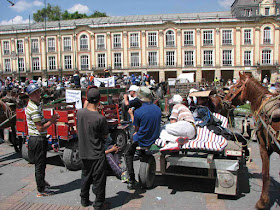 |
| Horsecarts and their drivers invaded Plaza Bolivar. |
 But these horsecarts, known as zorreros, were rallying for their right to be a part of Bogotá's present and future. Bogotá has thousands of horsecarts - used by poor people who scavange and resell stuff, vend from the carts or make deliveries.
But these horsecarts, known as zorreros, were rallying for their right to be a part of Bogotá's present and future. Bogotá has thousands of horsecarts - used by poor people who scavange and resell stuff, vend from the carts or make deliveries.The city has repeatedly tried to ban the horsecarts, and the latest deadline is coming at the end of this month. However, the city hasn't advanced at all with a plan to give the horsecart users motorized tricycles to replace the carts. The plan would probably never work, anyway. For these families, the horsecarts are not only a way of making a living, but also a way of life, and they won't easily change - nor can they likely afford to buy gasoline, when the horses are fed virtually for free.
And does Bogotá really need more polluting motor vehicles?
 |
| Poor, workikng people: a zorrero family. |
It sure seems contradictory that at the same time that Bogotá is trying to kick off a recycling program, it's considering banning the vehicles which the cities' principal recyclers use.

Animal rights defenders say that many of the horses are abused, underfed and overworked, which is undoubtedly true. Some have also made the absurd argument that the horsecarts are bad for traffic congestion - when a glance at Bogotá's traffic jams makes obvious that they're there because there are way too many cars, not horsecarts. City officials' real reason for wanting to ban the carts, one suspects, is a desire to create an image of a sanitized, modern city. But close to half of Bogotanos live in poverty, and the city's wealthy deserve to be reminded of that.
If the city does ban the horsecarts, then the impoverished families with little education who depend on them would be pushed even deeper into poverty and some will undoubtedly turn to crime.
The real solution is for the city to produce more jobs. But that will take a long time, if it ever happens. Until then, the zorreros are supporting their families and fulfilling an important social, economic and environmental function.
I'd suggest that the wealthy in their polluting SUVs, purchased by burning coal or marketing useless gimmicks, who feel so embarassed and annoyed by the zorreros' mere existence, contribute much less for their city.
Related Posts: End of the road for Bogotá's horsecarts?
The zorreros fight for their way of life.
 |
| While their drivers have lunch, these horses do too in the Santa Fe Neighborhood. |
 |
| Overloaded? A horsecart trots up Calle 13. |
By Mike Ceaser, of Bogotá Bike Tours








No comments:
Post a Comment